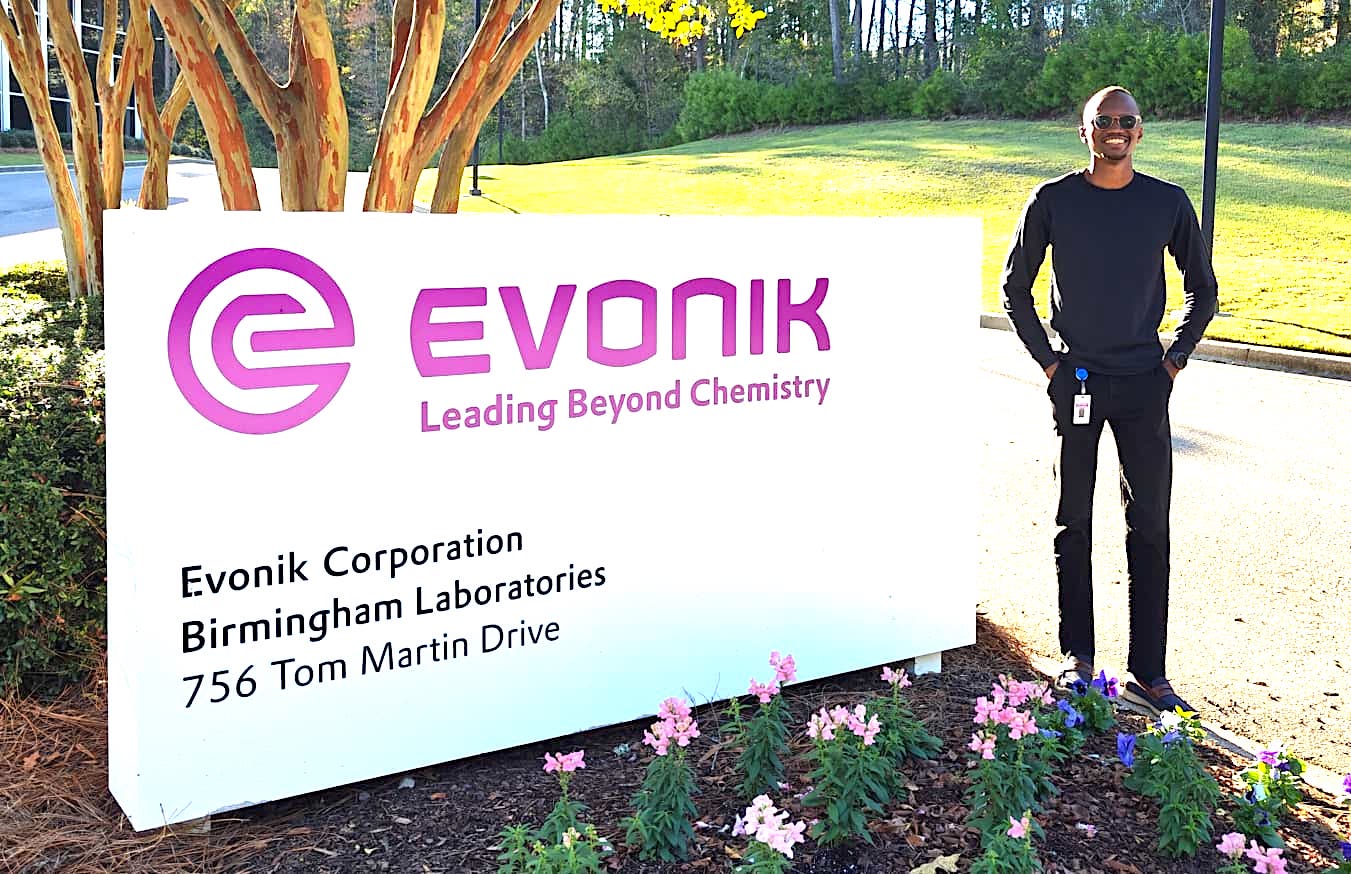FTPP internship helps student find a great workplace fit

A great fit is good for business, and a great fit is what 2024 University of Alabama at Birmingham graduate Emmanuel Ramogi found when he interned at Evonik Birmingham Laboratories while still a student.
Ramogi was a 2024 intern in the Corporate Internship Plasma Training (CIPTA) program sponsored annually by the Future Technologies & enabling Plasma Processes (FTPP) grant, and the fit was so good that after he graduated, he became an Evonik contract employee. For a little over a year, he’s been a process engineer, a position in which he works closely with Dr. Jian-Feng Zhang, a senior research and development scientist.
“It’s been rewarding to witness Emmanuel’s growth from intern to valued team member at Evonik, exemplifying the strength of our FTPP program in cultivating future talent,” says Dr. Zhang. “His proactive approach and innovative contributions, most notably his participation in the Global Ideation Jam, demonstrate his commitment to driving impactful change.”
FTPP is a $20 million grant from the National Science Foundation (NSF) managed by The University of Alabama in Huntsville that supports a collaboration of nine statewide universities and a research organization dedicated to plasma research, commercialization and the establishment of a plasma workforce in Alabama. The CIPTA internship is designed to allow plasma science and engineering students to gain real-world knowledge while getting a feel for the after-graduation workplace.
Connections
His experience is an example of the kind of connections that can happen through FTPP’s internships, and Ramogi says that everything clicked as he interned at Evonik.
“I also appreciated how open and supportive everyone was, whether it was through mentoring, sharing knowledge, or simply creating an environment where questions were encouraged,” Ramogi says. “The work was engaging and meaningful, but it was the people and the atmosphere that truly stood out.”
“From the onset, I was impressed by the team’s culture of collaboration, growth and respect,” he says. “I never felt like I was just there to observe. My ideas were genuinely listened to and taken seriously.”
Ramogi says he felt like a valued part of the team because of the level of trust and inclusion at Evonik, which makes bioresorbable polymers for medical devices and drug delivery, as well as custom-manufactured parenteral drug products for other pharmaceutical companies.
Ramogi says he knew Evonik was the kind of environment where he could continue learning, contributing and growing after becoming a master’s graduate in mechanical engineering with a specialization in integrating machine learning with computational methods.
“I was exceedingly glad when the opportunity came for me to rejoin the team.”
During his internship, he learned about the different testing methods and equipment used to characterize materials used in the development of medical-grade polymers.
“I gained hands-on experience analyzing how various properties such as surface energy influence product performance,” Ramogi says. “This tied in perfectly with my summer research on surface modification using plasma.”
“Now, in my current role as a process engineer, those lessons have been invaluable. I often need to identify critical process parameters and test different manufacturing conditions to ensure product quality and consistency. The technical foundation and problem-solving approach I developed during my internship really set me up for success and continued growth in this field.”
The experience helped connect his theoretical knowledge with real-world applications in material science.
He’s become more proficient on both the technical and personal levels.
“On the technical side, I’ve strengthened my understanding of manufacturing processes, product development and cross-functional collaboration,” Ramogi says.
“Beyond that, Evonik has really helped me develop my soft skills. I’ve become much more confident in facilitating meetings, presenting ideas and communicating effectively with different stakeholders across projects.”
systems fascination
Originally from Kenya, Ramogi’s interest in engineering began at home.
“Both of my parents worked as air traffic controllers, and while they weren’t engineers, their explanations of how planes operate sparked my curiosity about machines and systems,” he says. A fascination with understanding and optimizing complex systems led Ramogi to pursue mechanical engineering.
“Of course, Evonik doesn’t make airplanes, but the same principles of designing systems with safety, efficiency and quality still apply,” he says. “I get to contribute to projects where I help design processes that actually work in the real world, which is pretty much as exciting as keeping a plane in the air – without the risk of turbulence.”
Ramogi’s career goals include becoming an expert in the design and manufacturing of medical devices.
“I intend to deepen my technical knowledge and practical experience in developing safe, effective and innovative products that improve patient outcomes,” he says. “Ultimately, I hope to contribute to advancing both process efficiency and product quality in ways that make a real difference in healthcare.”

